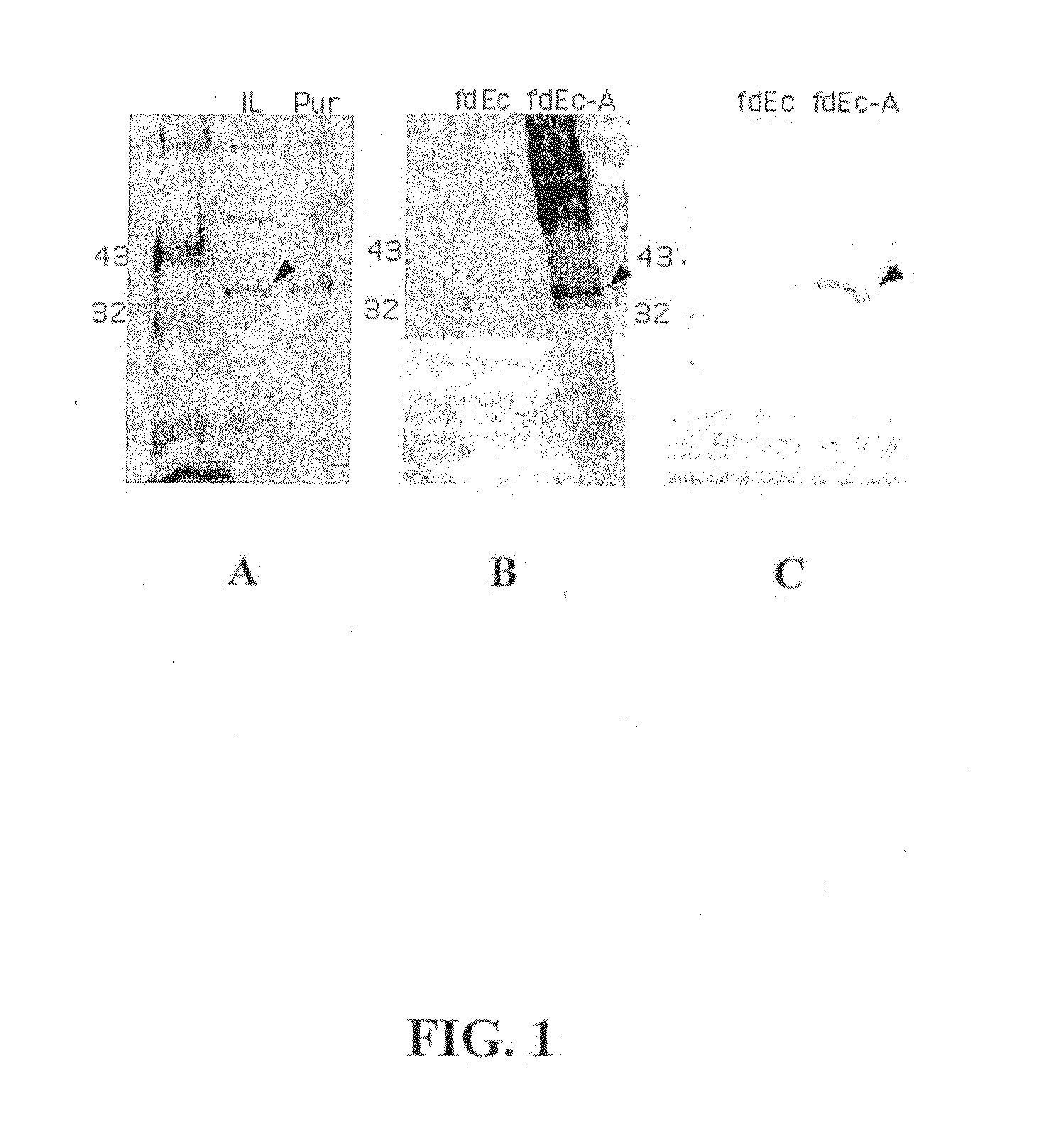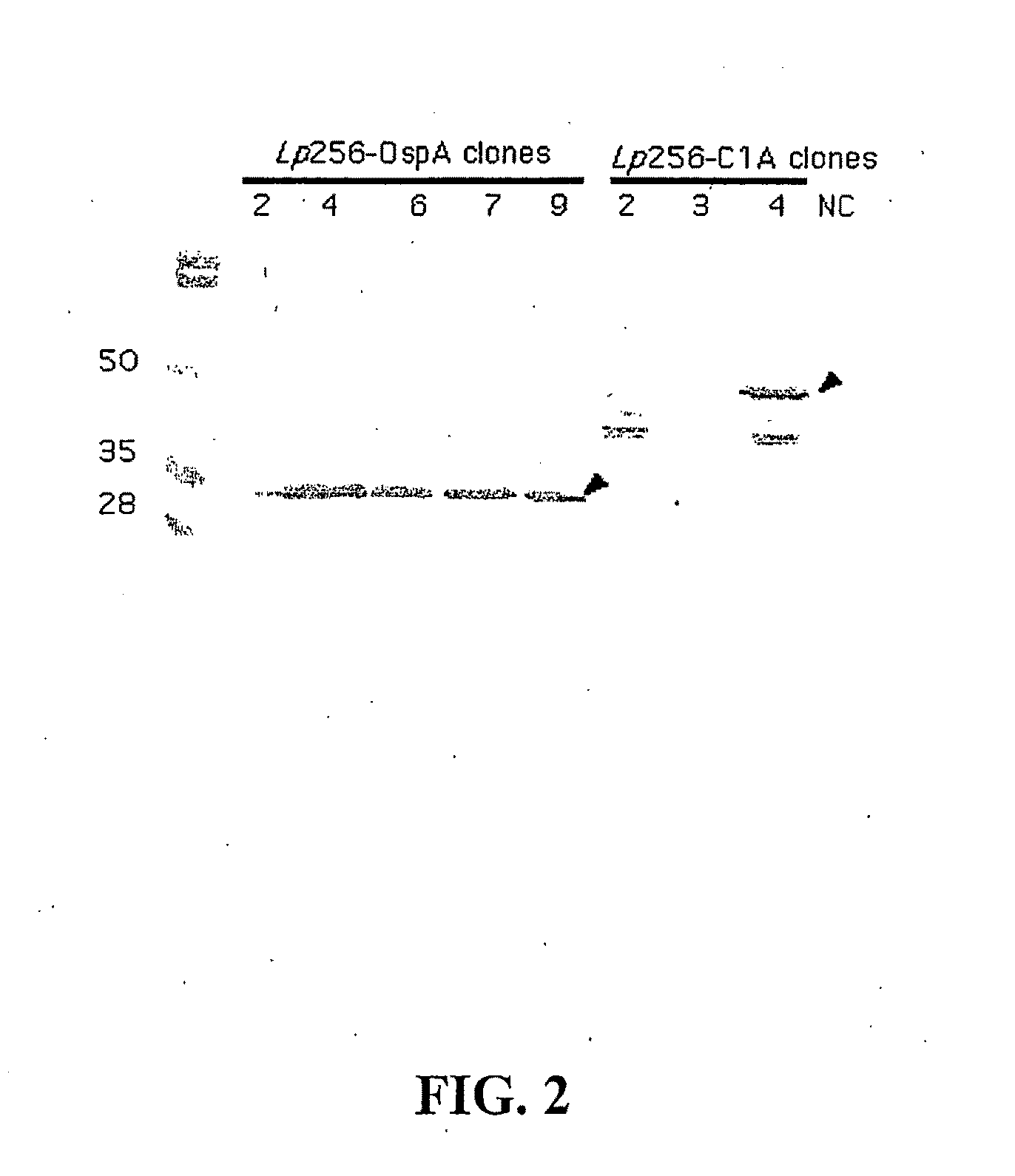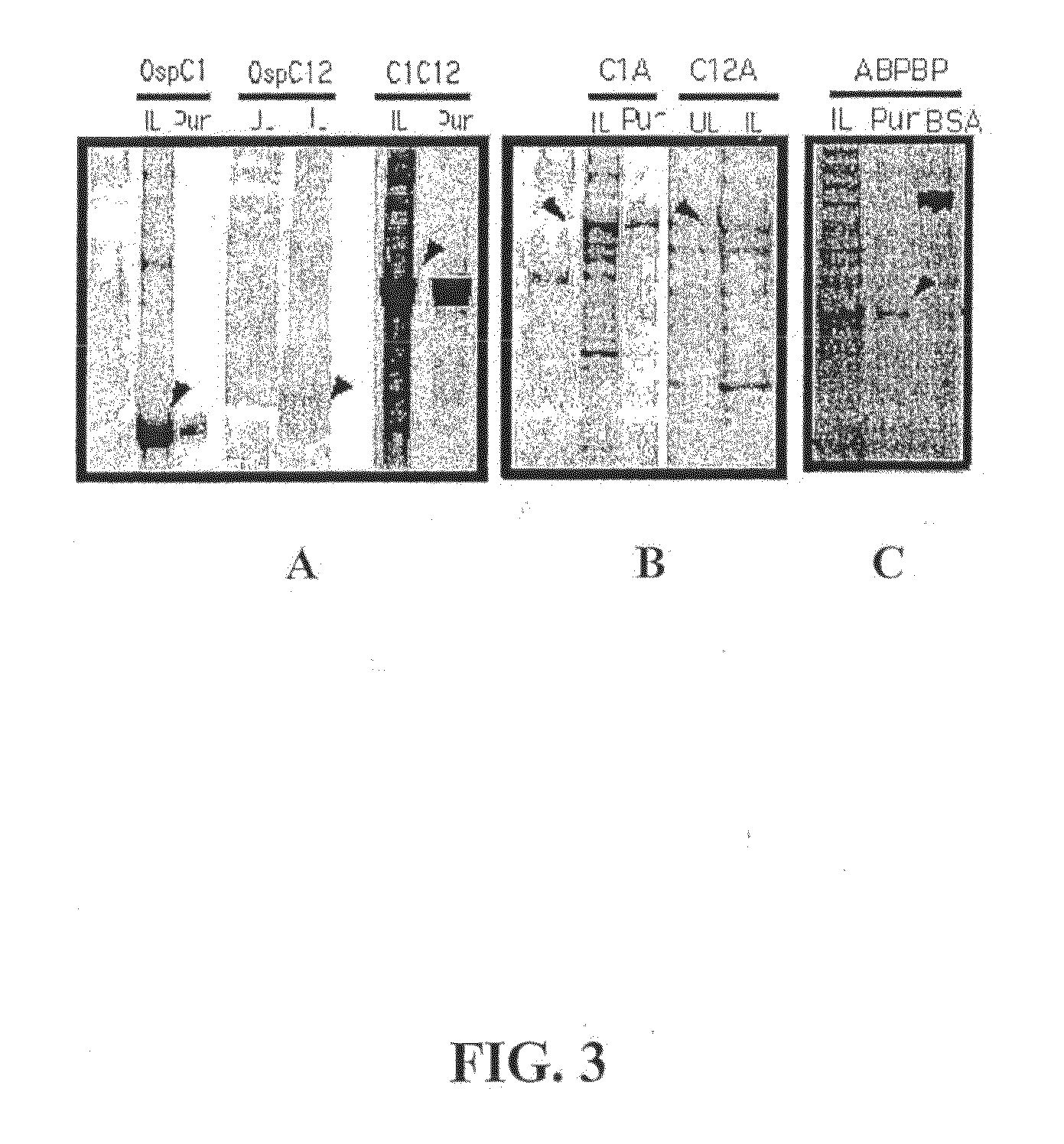Oral vaccine for Borrelia
a technology for borrelia and oral vaccine, which is applied in the field of oral vaccines for borrelia infections, can solve the problems of outlawing the use of oral vaccines, unable to meet the needs of patients, and unable to control b. burgdorferi through methods,
- Summary
- Abstract
- Description
- Claims
- Application Information
AI Technical Summary
Benefits of technology
Problems solved by technology
Method used
Image
Examples
example 1
Lyophilization of Recombinant Bacteria Expressing B. burgdorferi Antigens
[0157]Escherichia coli BL21 (DE3) pLysS carrying a plasmid of interest (pET9c-OspA, pET9c-C1, pET9c-C12, pET9c-C1.C12 or pET9c-OspCx.A) is induced for protein expression with IPTG when the OD600 reaches 0.4. Bacterial cells are grown for 3 hr and harvested at 5000 g for 10 min at 4° C. Cells are re-suspended in 20 ml of TBY containing 24% sucrose (Gu et al., J Biotechnol, 88:95-105, 2001). Ten ml of cells are transferred to a 50 ml glass tube and are quickly frozen in a bath of dry-ice / ethanol. The tubes are tilted while freezing to get a greater surface area. These tubes are placed in lyophilizer overnight for 24 hr after which the tubes are placed −70° C. for storage until use. This method is also contemplated to be suitable for freeze drying Lactobacillus spp.
example 2
Purification of Recombinant B. burgdorferi Proteins
[0158]Escherichia coli (strain BL21(DE3)pLysS) transformed with the pET9c plasmid encoding one or more B. burgdorferi gene(s) is grown in 1000 ml LB media (5 μl NaCl, 10 μl tryptone, 5 g / l yeast extract, 25 μg / l chloramphenicol and 30 μg / l kanamycin) at 37° C., with shaking. When the OD600 of the cultures reaches 0.4-0.6, protein expression is induced by the addition of IPTG to a final concentration of 0.5 mM, and cells are then grown for another 4 hr. The cultures are harvested by centrifugation at 3800 g for 5 min, and the cells are resuspended in 30 ml of 20 mM NaPO4, pH 7.7. The crude extracts are stored at −20° C. overnight. The frozen cell suspensions are incubated at 4° C. for 12-14 h in the presence of a protease inhibitor cocktail solution (Roche). Once thawed, the cell suspensions are incubated at room temperature with DNase I (6.7 μg / ml) and 5 mM of MgCl2 for 30 min. Cellular debris is pelleted by centrifugation at 15000×...
example 3
Enzyme Linked Immunosorbent Assay (ELISA)
[0159]Purified B. burgdorferi protein is used to coat microwell plates (MAXISORP, Nunc) at a concentration of 2.5 μg / ml in coating buffer (100 mM Bis-Tris Propane pH 9.7 containing 0.02% sodium azide) at 100 μl / well. The microwell plates are incubated at 37° C. for 1 hr. The solution is decanted from the wells and the plates are washed three times with 300 μl / Well of TBST solution (26 mM Tris Base, 0.137 M NaCl, 0.01% Tween 20, 0.02% sodium azide). The microwell plates are blocked with 300 μl / well blocking buffer (100 mM Bis-Tris Propane pH9.7, 3.0% dry milk, 0.1% Tween 20, 0.02% sodium azide). Following 1 hr incubation at 37° C. the plates are washed three times. The antibody-binding procedure for the ELISA assay is as follows: serum samples are diluted 1:100 or 1:1000 in specimen diluent (20 mM Tris Base pH 7.5, 136 mM sodium chloride, 1.0% dry milk, 0.10% Tween 20, 0.02% sodium azide) at 100 μl / well and incubated for 1 hr at 37° C. The sol...
PUM
| Property | Measurement | Unit |
|---|---|---|
| Fraction | aaaaa | aaaaa |
| Fraction | aaaaa | aaaaa |
| Fraction | aaaaa | aaaaa |
Abstract
Description
Claims
Application Information
 Login to View More
Login to View More - R&D
- Intellectual Property
- Life Sciences
- Materials
- Tech Scout
- Unparalleled Data Quality
- Higher Quality Content
- 60% Fewer Hallucinations
Browse by: Latest US Patents, China's latest patents, Technical Efficacy Thesaurus, Application Domain, Technology Topic, Popular Technical Reports.
© 2025 PatSnap. All rights reserved.Legal|Privacy policy|Modern Slavery Act Transparency Statement|Sitemap|About US| Contact US: help@patsnap.com



